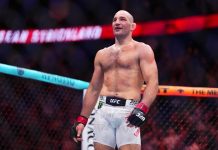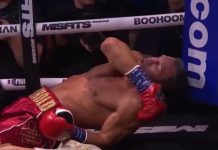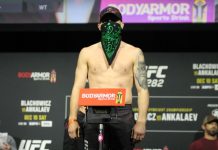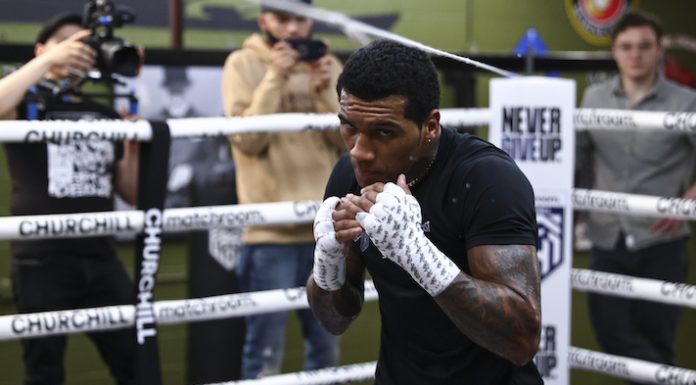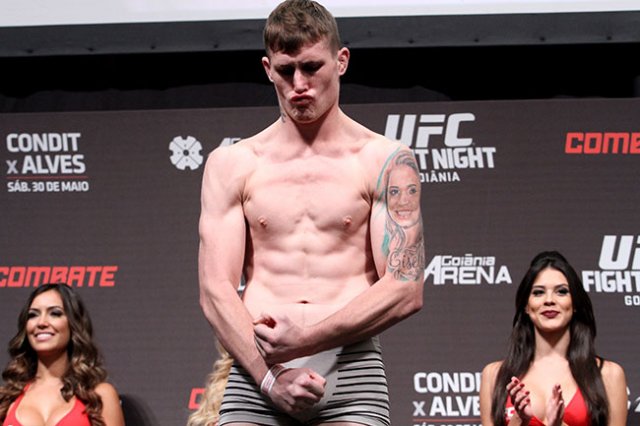
Darren Till’s weight cut was scary. But frankly, it never should have come to the point where the “welterweight” was forced to the point of temporary blindness.
The refrain was familiar. “The Nevada State Athletic Commission is going to test them, OK?” Dana White said of drug testing for Georges St. Pierre and Johny Hendricks back at UFC 167. GSP had just won a razor thin decision. He then announced he was taking a sabbatical from the sport. In part, it was due to frankly piss-poor testing for performance enhancing drugs. The commission excuse had been marched out for years, and was getting tired. Even White knew that. Yet the UFC President was furious that one of his biggest stars had just announced an extended vacation, essentially out of nowhere. He implored St. Pierre to “pick up the phone” if he wanted to “talk like a man,” whatever that meant.
GSP’s message had been pretty clear, man or otherwise. Drug testing in MMA sucked. He wasn’t interested in fighting until it got better.
To be fair, that was not St. Pierre’s only reason for walking away from the sport. Yet it may have been the development that finally forced the UFC to act. A year and a half later, the UFC’s Anti-Doping policy under USADA (the U.S. Anti-Doping Agency) was in full swing. With it came out-of-competition testing. And dozens of suspensions for performance enhancing drugs. Some of the sport’s biggest names saw their cheating ways exposed. Anderson Silva. Brock Lesnar. Jon Jones.
GSP’s declaration had been a line in the sand. A watershed moment. The UFC was forced to act. When he returned four years later to win the UFC middleweight title from Michael Bisping, he returned to a much cleaner sport.
The next battle will be weight cutting. And the horrific video of UFC Liverpool headliner Darren Till cutting weight to the point of losing his vision should be the next line in the sand. Watching Till collapse at times on the video, watching his team surrounding him, a mix of concern and determination at play — it’s clear that fighters, or even their coaches, may be too competitive to call off a weigh cut when they should. When Till hits the point of losing his vision during the cut, forcing him off the treadmill (only to say that he still wants to run) — lets be blunt. It should never have even come to that point.
Yes, Till experienced a personal emergency during his weight cut. Still, he missed weight by three and a half pounds, which suggests this was never going to be an easy cut to begin with. Till’s opponent at UFC Liverpool, Stephen Thompson, is not the smallest welterweight. Yet his was the noticeably smaller man in the cage last weekend.
In an added twist, Till actually weighed in a second time prior to UFC Liverpool, coming in slightly heavier after undergoing colonic hydrotherapy. In other words, he was so dehydrated, his body absorbed moisture from the process, rather than it taking any weight off.
We’ve seen weight cuts lead to death in other promotions and sports. More than once, sadly. For all the cries of “will someone have to die before the UFC gets serious about drug testing?!?” back in the day, it’s weight cutting that poses the bigger risk of death.
So now that one has been cleaned up (as best it can be), how about focusing on the other? It won’t be pretty. Fighters won’t like it. It won’t be just fines, but forcing fighters who blow cuts to move up in weight. Ensuring that they have a doctor’s clearance to compete at a certain weight.
There’s probably going to be a cost, although it should be a fair bit cheaper than USADA. Good thing the UFC has all that ESPN money.
There certainly is an argument to be made that Till’s team should have shut his cut down far sooner. There’s an argument to be made that he never should have been allowed to compete in the weight class at all, frankly. However, let’s just make sure than no one is on a treadmill, cutting weight to the point of vision loss ever again.










